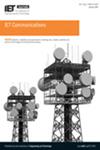Task offloading and resource allocation for blockchain‐enabled mobile edge computing
IF 1.5
4区 计算机科学
Q3 ENGINEERING, ELECTRICAL & ELECTRONIC
引用次数: 0
Abstract
Mobile edge computing (MEC) has risen as an effective approach to support ubiquitous and prosperous mobile applications. Due to the strict delay requirements and the increasingly complex application environments, the computation efficiency and security have become the bottleneck that restricts the MEC system. Here, a blockchain‐enabled task offloading scheme is proposed, where the sensitive computation tasks of user terminals (UTs) can be offloaded to a blockchain‐assisted base station (BS). The MEC‐assisted BS helps UTs compute tasks while the blockchain consensus protocol ensures the security of the task offloading and computing process. To manage the allocation of computing resources between task offloading and blockchain consensus, the task offloading and resource allocation are formulated as a joint optimization problem. The aim of the problem is to minimize the energy consumption of UTs while guaranteeing the delay requirement. By transforming the original problem into a Markov decision process, a collective reinforcement learning algorithm is proposed to solve the problem in an online fashion. In the simulations, the convergence and the performance of the proposed scheme are evaluated. The simulation results show the effectiveness of the scheme.区块链移动边缘计算的任务卸载和资源分配
移动边缘计算(MEC)已成为支持无处不在、日益繁荣的移动应用的有效方法。由于严格的延迟要求和日益复杂的应用环境,计算效率和安全性成为制约移动边缘计算系统的瓶颈。本文提出了一种区块链任务卸载方案,即把用户终端(UT)的敏感计算任务卸载到区块链辅助基站(BS)。MEC 辅助基站帮助 UT 计算任务,而区块链共识协议则确保任务卸载和计算过程的安全性。为了管理任务卸载和区块链共识之间的计算资源分配,任务卸载和资源分配被表述为一个联合优化问题。该问题的目的是在保证延迟要求的前提下最大限度地降低 UT 的能耗。通过将原始问题转化为马尔可夫决策过程,提出了一种集体强化学习算法来在线解决该问题。在仿真中,对所提方案的收敛性和性能进行了评估。仿真结果表明了该方案的有效性。
本文章由计算机程序翻译,如有差异,请以英文原文为准。
求助全文
约1分钟内获得全文
求助全文
来源期刊

IET Communications
工程技术-工程:电子与电气
CiteScore
4.30
自引率
6.20%
发文量
220
审稿时长
5.9 months
期刊介绍:
IET Communications covers the fundamental and generic research for a better understanding of communication technologies to harness the signals for better performing communication systems using various wired and/or wireless media. This Journal is particularly interested in research papers reporting novel solutions to the dominating problems of noise, interference, timing and errors for reduction systems deficiencies such as wasting scarce resources such as spectra, energy and bandwidth.
Topics include, but are not limited to:
Coding and Communication Theory;
Modulation and Signal Design;
Wired, Wireless and Optical Communication;
Communication System
Special Issues. Current Call for Papers:
Cognitive and AI-enabled Wireless and Mobile - https://digital-library.theiet.org/files/IET_COM_CFP_CAWM.pdf
UAV-Enabled Mobile Edge Computing - https://digital-library.theiet.org/files/IET_COM_CFP_UAV.pdf
 求助内容:
求助内容: 应助结果提醒方式:
应助结果提醒方式:


